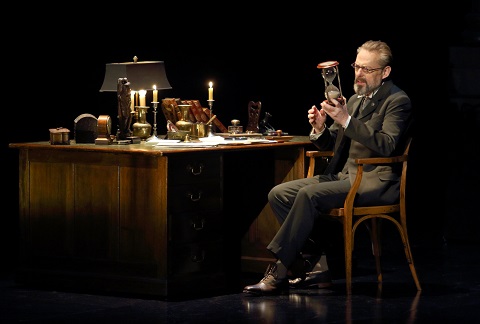Aschenbach’s gesture, in the opening scene of David McVicar’s astonishingly
hypnotic production of Benjamin Britten’s final opera, anticipates a symbol
which does not appear until the latter scenes of Mann’s text, when,
following the vulgar musical performance of a group of ‘beggar virtuosi’ in
the front garden of the Hotel des Bains, he steals a glance at the young
Polish boy Tadzio and reflects, in what Mann describes as ‘that sober
objectivity into which the drunken ecstasy of desire somethings strangely
escapes’: ‘He’s sickly, he’ll probably not live long.’ Into Aschenbach’s
mind intrudes a memory of his parents’ house, many years ago: ‘he suddenly
saw that fragile symbolic little instrument as clearly as if it were
standing before him. Silently, subtly, the rust-red sand trickled through
the narrow glass aperture, dwindling away out of the upper vessel, in which
a whirly vortex had formed.’
[1]
Thus, with subtle symbolic foreshadowing, McVicar begins to tell Mann’s
and Britten’s tale. Like the rust-red hair shared by the sinister figures
who cross Aschenbach’s path in the action which unfolds, the vanishing sand
is ominous. “My mind beats on and no words come,” sings Aschenbach. Time is
running out: “No sleep restores me.” Repeated references to the passing
hours infiltrate Mann’s text and in McVicar’s production the defiant clock
makes its presence felt, nowhere more so than when an outsize pendulous
clock-face descends and hangs in suspended motion above the gondola in
which Aschenbach sits, agitatedly, his attempt to depart from Venice
thwarted by the misdirection of his luggage.
The Hotel Barber may promise to restore his youthful looks but Aschenbach’s
creative spirit is sterile, guttering like the candles on his desk. His
journey to the South, driven by the Strange Traveller’s encouragement that
he might quench his spiritual thirst - “a leaping, wild unrest, a deep
desire! […] a sudden desire for the unknown” - is an attempt to return to
the past: “I am led to Venice once again,” Aschenbach sings, later fearing,
“O Serenissima, be kind, or I must leave, just as I left before.” But, the
sand runs steadfastly downwards.
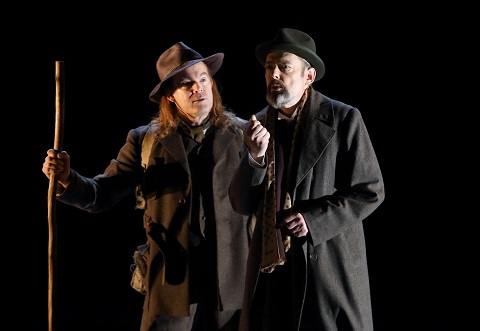 Gerald Finley (Traveller) and Mark Padmore (Aschenbach). Photo credit: Catherine Ashmore.
Gerald Finley (Traveller) and Mark Padmore (Aschenbach). Photo credit: Catherine Ashmore.
The tremendous achievement of McVicar, his creative team and a superb,
extensive cast, is to simultaneously portray the mythical aura of the city
of Venice and present a disturbing portrait of a psychology laid bare. The
naturalism of the 1910s setting and the astonishingly detailed realism of
Vicki Mortimer’s designs are intruded by the surreal, the grotesque and the
demonic. The result for Aschenbach is catastrophic.
McVicar, Mortimer and lighting designer Paul Constable exercise masterly
control of these two intersecting energies, capturing in form and flux both
the wretched reality and the mythic grandeur of Venice. A prevailing
darkness is punctuated by sudden illuminations of light. The golden glow
that greets Aschenbach when the Hotel Manager reveals the glorious view
from the window of his room, for a brief moment bathes the drama in hope.
But, elsewhere, for all the vivid colour that Apollo’s sunrays reveal, the
Lido often seems to shimmer with a secret sickness. When the vista opens to
reveal the glistening teal waters of the limitless sea, the easefulness
that the brightness offers is tempered by a thick, unmoving green glow. The
sky above is cloudless, but it is muted by a patina of soft grey or pink
flush.
When Aschenbach arrives by gondola through the swirling mists, we can
almost smell the pungency - what he later describes as a “sweetish
medicinal cleanliness, overlaying the smell of still canals”. Even the
clarion purity of the cry of the Strawberry Seller (Rebecca Evans) as she
advertises her wares is deceptively sweet, for her red fruit is laden with
choleric juices.
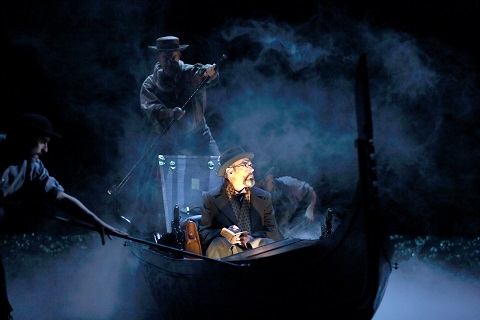 Gerald Finley (Gondolier) and Mark Padmore (Aschenbach). Photo credit: Catherine Ashmore.
Gerald Finley (Gondolier) and Mark Padmore (Aschenbach). Photo credit: Catherine Ashmore.
As within Aschenbach’s own imagination and consciousness, nothing is still
in the city or its lagoon. A stage-length gondola is expertly manipulated
across and around the stage, twisting through the inky blackness; beyond
pillars and arches which slide with the slick slipperiness of the boatman’s
oar we glimpse piazzas, arches, basilicas, as our emblematic Charon carries
Aschenbach towards his fate. The stagnant waters dominate, and McVicar
repeatedly lets a black drop fall, to isolate Aschenbach as he sinks
further into the abyss of his own mind and soul. Venetian hordes bustle and
barter: tourists from across Europe gather in the cafés and on the strand;
lace-sellers and glass-makers press their wares upon the repulsed
Aschenbach, crowding beneath the claustrophobic arches. The individuals of
the company excel, and deserving of especial note are Dominic Sedgwick’s
English Clerk, who is the lone deliverer of the truth of Venice’s innate
corruption, and Colin Judson’s Hotel Porter, though the latter’s
middle-aged censoriousness belies the youthfulness of Mann’s original.
Amid the restlessness, though, there is statuesque motionlessness:
in the form of the young Polish boy, Tadzio, holidaying with his mother,
the Lady of the Pearls (Elizabeth McGorian), and his siblings. And, it is
to this Hellenic apparition - what Mann’s narrator describes as ‘a
statuesque masterpiece of nature’ - that Aschenbach is drawn, a vulnerable
moth to a flame, increasingly convinced that, in the words of Mann’s
narrator, ‘it was inevitable that some kind of relationship and
acquaintance should develop between Aschenbach and the young Tadzio’.
In both novella and opera, Aschenbach is repeatedly reassured by moments,
actual or self-delusory, in which the respective gazes of man and boy are
locked together, and McVicar emphasises this ‘looking’ and ‘knowing’, not
just through the frighteningly confident stare with which Leo Dixon, First
Artist of the Royal Ballet, fixes the elderly writer with eyes that tempt
and dare, but also through more subtle symbols: the small round spectacles
which Aschenbach clutches and fumbles; the Brownie box-camera positioned on
the beach, its single-focus lens shrouded from the sun’s heat. “So, my
little beauty, you notice when you’re noticed do you?” Aschenbach’s
imagined private contact with Beauty hypnotises him, inducing a mental,
visual and moral stagnation: he cannot look away and, incapable of moral
resolution, abandons himself to his apocalyptic destiny.
As the self-tormented protagonist, Mark Padmore gives a performance of
unwavering acuity and accomplishment. For all his achievements as Bach’s
Evangelist and as an interpreter of Schubert’s and of Britten’s songs, he
surely has done nothing finer than this. The sweetness of his tenor, which
launches lightly and cleanly into the ethereal but also communicates the
pain and pathos of the actual, makes his Aschenbach a more sympathetic
sufferer than we might imagine possible.
Aschenbach may be isolated from his fellow travellers in Venice but the
directness of Padmore’s delivery, as he dominates the forestage, and the
exemplary articulacy of his diction, hold the fictional artist and the real
audience in a compelling communion. Mann described his protagonist’s inner
maelstrom, with autobiographical resonance, as a combustible creativity in
which the thoughts and spirit of the writer’s aged and youthful self,
circled each other animatedly.
[2]
And, this creativity, which is both fertility and conflagration, is what
Padmore, and McVicar, capture so persuasively. Padmore’s Aschenbach is not
so much animated as agitated and consumed, as evidenced by the cruel glow
of barber’s red cheek-rouge. The writer’s descent from novelistic
speculations and the belief that beauty will enable him to “liberate from
the marble mass of language the slender forms of an art”, to the desperate
recognition that he “can fall no further”, is consummately controlled and
paced.
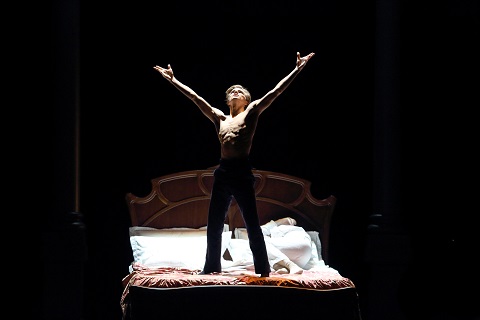 Leo Dixon (Tadzio). Photo credit: Catherine Ashmore.
Leo Dixon (Tadzio). Photo credit: Catherine Ashmore.
At the start Padmore demonstrates surprising depth and vigour of voice, as
when he celebrates his reputation - “I, Aschenbach, famous as a
master-writer, successful honoured, self-discipline my strength”. It’s an
almost fiery self-assertion which seeks to deny and defy encroaching
self-knowledge: “Why am I now at a loss? … Would not the light of
inspiration had not left me.” During his Act 2 pursuit of Tadzio and his
family through the fetid waterways and alleys of Venice, occasionally
Padmore is subsumed within the acrid agitation. But, it is the tenor’s
vocal nuance, perspicacity and control which most astounds: that, and the
stamina - this is an enormously demanding sing and Padmore’s tenor is no
less penetrating or well-supported at the excoriating close of the opera
than it was three hours previously, when Aschenbach had sat alone in his
darkened study.
‘“You see, Aschenbach has always only lived like this” - and the speaker
closed the fingers of his left hand tightly into a fist - “and never like
this” - and he let his open hand hang comfortably down along the back of
the chair,’ reports Mann’s narrator. And, so, Padmore’s hands in many ways
communicate Aschenbach’s distress and demise. Initially, he holds himself
with the rigid conformity of his class, hand behind back, spine ram-rod
rigid. Later, he grips his ornate leather-bound notebook, in which he seeks
to translate his emotive response to Tadzio’s beauty into Platonic art,
with clenched fingers; similarly, he contorts his hat’s rim and twists its
crown in febrile fists. And if, when accepting the offerings of the city he
exults as “Serenissma”, Aschenbach’s arms are outstretched, his palms open,
then he later acknowledges his moral degeneracy with the same welcoming, or
resigned, gesture.
Dixon’s Tadzio is introduced to us as a ‘real’ boy, somewhat petulant,
proud and aware of the effect of his posture and pose. In fact, McVicar
might have made the Polish family’s entrance more markedly gaze-grabbing,
for they seem to slip into the hotel foyer without undue notice; only in
Aschenbach’s feverish imagination does Tadzio almost instantly become an
immortal emblem of Hellenic beauty and form. And, what is so compelling
thereafter is the way the statuesque is always hovering on the cusp of
motion: this Tadzio is the union of art and life for which Aschenbach
longs.
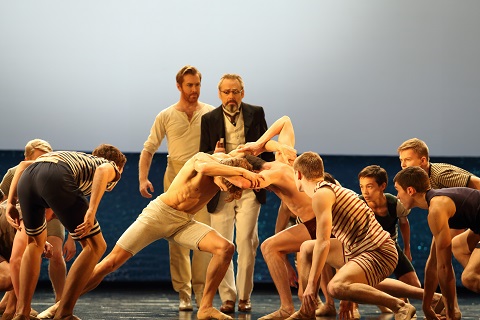 Tim Mead (Apollo), Mark Padmore (Aschenbach). Photo credit: Catherine Ashmore.
Tim Mead (Apollo), Mark Padmore (Aschenbach). Photo credit: Catherine Ashmore.
McVicar does not shy from the potential difficulties posed by the dance
elements of Britten’s opera and, just as the opera assimilates both realism
and surrealism, so the dance segues seamlessly from naturalism to artifice.
In the children’s beach games, cartwheels and tumbles twist into pirouettes
and entrechats, the youths’ athleticism suggesting both freedom and
rebellious danger. Dixon’s duets with Olly Bell’s Jaschiu shift between
aggression and sensuality. The crouches, curves and curlicues are quite
simply mesmerising to behold. The Games of Apollo have a choreographic
persuasiveness which beguiles. I was not entirely convinced, though, by
McVicar’s notion of an Apollo-cum-gym teacher;
Garsington's
2015 production seemed more forthright and more successful in this regard.
But, Tim Mead was penetrating and dulcet in equal measure, if a little dour
for the sun God.
From his first uncanny entrance, as the Stranger-Traveller in the
graveyard, understated but suggestive in his intimations to the troubled
Aschenbach, Gerald Finley injected the grotesque, ghostly and mysterious
into the drama. His incarnations accrued symbolic and disturbing resonance:
his lewd, lecherous Elderly Fop appalled; the vanishing gondolier alarmed;
the crude balladeer - the Leader of the Players - shocked, as much for the
faux-dwarf deformity that he relished brandishing as for the menacing
taunt, “How ridiculous you are!”, with which he and his troupe flagellated
the flinching Aschenbach.
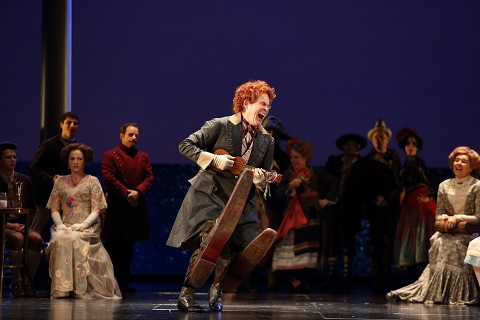 Gerald Finley (Leader of the Players). Photo credit: Catherine Ashmore.
Gerald Finley (Leader of the Players). Photo credit: Catherine Ashmore.
The culmination of Aschenbach’s struggle to reconcile the aesthetic with
the homoerotic is a Dream sequence of terrifying viscerality. Apollo and
Dionysus fight for supremacy as Aschenbach writhes on a bed between them;
Tadzio mounts the sleeping Aschenbach’s counterpane and strikes a pose of
proud confrontation.
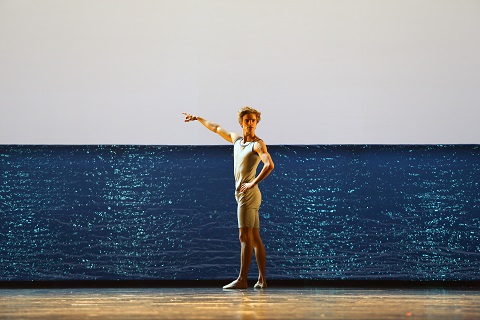 Lee Dixon (Tadzio). Photo credit: Catherine Ashmore.
Lee Dixon (Tadzio). Photo credit: Catherine Ashmore.
But, McVicar and Padmore save something, perhaps everything, for the
opera’s closing sequence, which is both transcendent (symbolic and mythic)
and real (psychologically penetrating). Dixon’s beautifully muscular Tadzio
stands upright - poised or posed - against the horizontal line where the
sea meets the sky: a symbol of the Beauty which exerts a fatal fascination
over Aschenbach’s fading creating imagination. The boy is a ‘perfect’ form,
but one which leads Aschenbach into the formless nothingness of the
Venetian waters, and on to the sea, and onwards to oblivion.
In Mann’s novella, Aschenbach strains to identify the young boy’s name: is
it ‘Adgio’, or ‘Adgiu’, with a long u, the ‘euphony
befitting to its object’? In the opera, the children’s affectionate
“Adziù!” merges with the demonic cries of Dionysus's “Aa-oo”. The Hellenic
idol, Tadzio, has a name which trickles like the sands of time: Adziù -
Tadziu - Todesengel. The angel of death. But, even as we watch Padmore’s
Aschenbach slump into eternal slumber, we see Dixon’s Tadzio scoop and
spin, an emblem of Beauty eternal. And, we remember that Aschenbach,
watching the children’s beach games, had rejoiced: “Ah, how peaceful to
contemplate the sea, immeasurable, unorganised, void. I long to find rest
in perfection.”
Claire Seymour
Gustav von Aschenbach - Mark Padmore, Traveller/Old Gondolier/Hotel
Manager/Elderly Fop/Hotel Barber/Leader of the Players/Voice of Dionysus -
Gerald Finley, Voice of Apollo - Tim Mead, Tadzio - Leo Dixon, Lady of the
Pearls - Elizabeth McGorian, Jaschiu - Olly Bell, Strawberry Seller
-Rebecca Evans, Lace Seller - Masabane Cecilia Rangwanasha, Danish Lady -
Elizabeth Weisberg, English Lady - Katy Batho, Russian Nanny - Rosie
Aldridge, German Mother - Hanna Hipp, Russian Spinster - Amanda Baldwin,
French Mother - Rebecca Lodge Birekebaek, Hotel Porter - Colin Judson, Boy
Player - Andrew Tortise, Glass Maker - Sam Furness, Steward - Andrew
O’Connor, English Clerk - Dominic Sedgwick, German Father - Michael
Mofidian, Lido Boatman - Byeongmin Gil, Russian Father - Dominic Barrand,
Russian Boy - Mathew Prichard, Tadzio’s Sisters - Corey Annand/Alice
Guilot, German Boy - Lewis Bondu, Polish Governess - Sirena Tocco, French
Girl - Adrianna Forbes-Dorant, Russian Girls - Fleur Hinchchliffe/Henrietta
Howley, Dancers (David Stirrup, Arnau Velazquez, Aitor Viscarolasaga López,
Hayden Davis, Euan Garrett, Matthew Humphreys, Zavier Linstrom, Leonardo
McCorkindale, Casper Mott, Alfie Pearce, Harry Sills), Actors (Josephine
Arden, Irene Hardy, Marcos James, Simon Johns); Director - David McVicar,
Conductor - Richard Farnes, Choreographer - Lynne Page, Designer -Vicki
Mortimer, Lighting Designer - Paule Constable, Associate Director - Leah
Hausman, Associate Choreographer - Gareth Mole, Orchestra of the Royal
Opera House.
Royal Opera House, Covent Garden, London; Thursday 21st November
2019.
[1]
Translated by David Luke, ‘ Death in Venice’ and Other Stories (Secker & Warburg,
1900)
[2]
‘Sein Geist kreiste, sein Gedächtnis warf uralte, seiner Jugend
überlieferte und bis dahin niemals von eigenem Feuer belebte
Gedanken’, in Die schönsten Erzählungen der Welt (The most
beautiful stories in the world ) (1938).
